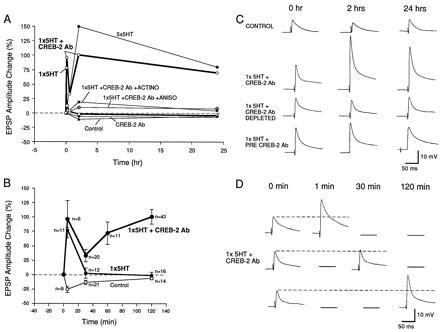Figure 2.

Time course of the effects of injection of ApCREB2 antiserum on short- and long-term facilitation. (A) Time course of excitatory postsynaptic potenial (EPSP) amplitude changes recorded in motor neuron L7 in response to stimulation of the sensory neuron (expressed as percent change in the amplitude of the EPSP) after single and multiple applications of 5-HT to Aplysia sensory–motor neuron cocultures. Changes in EPSP amplitude after application of one 5-min pulse of 5-HT (1× 5-HT, short-term facilitation) and one 5-min pulse of 5-HT paired with injection of anti-ApCREB2 antibodies (1× 5-HT + CREB-2 Ab, both in boldface lines) are compared with changes in EPSP amplitude induced by five pulses of 5-HT (5× 5-HT) at 2 and 24 hr. While the EPSP facilitation decays rapidly after one pulse of 5-HT (with a return to base line after 10 min), pairing one pulse of 5-HT with injection of anti-ApCREB2 antibodies induces a long-term facilitation paralleling that of 5× 5-HT. This long-term facilitation is abolished by the application of the protein synthesis inhibitor anisomycin (1× 5-HT + CREB-2 Ab + ANISO) or the RNA synthesis inhibitor actinomycin D (1× 5-HT + CREB-2 Ab + ACTINO) during the training. The difference in EPSP amplitude at 2 hr between 5× 5-HT and 1× 5-HT + CREB-2 Ab may reflect the transient protein synthesis-dependent, but RNA synthesis-independent, component of long-term facilitation 2 hr after 5-HT stimulation (29). The controls are either untreated (control), or injected with ApCREB2 antiserum without 5-HT administration (CREB-2 Ab). (B) Comparison of the time course of the EPSP amplitude changes in the first 2 hr after application of a single 5-min pulse of 5-HT with or without injection of CREB-2 antibody. The control cells were not exposed to 5-HT. (C) Example of EPSPs recorded in motoneuron L7 after stimulation of the sensory neuron before (0 hr) and 2 and 24 hr after 5-HT treatment. One pulse of 5-HT paired with the injection of an ApCREB2 antiserum induces a significant increase in EPSP amplitude at 2 and 24 hr, but injection the preimmune serum (PRE-CREB-2 Ab) or depleted immune serum does not induce long-term facilitation. (D) Examples of EPSPs recorded at indicated times in cocultures injected with ApCREB2 antiserum paired with one 5-min pulse of 5-HT. [Reproduced with permission from Bartsch et al. (27) (Copyright 1995, Cell Press).]
